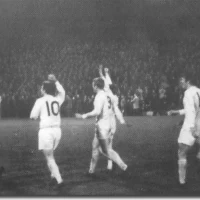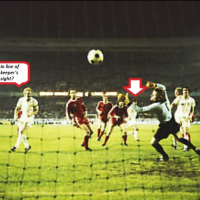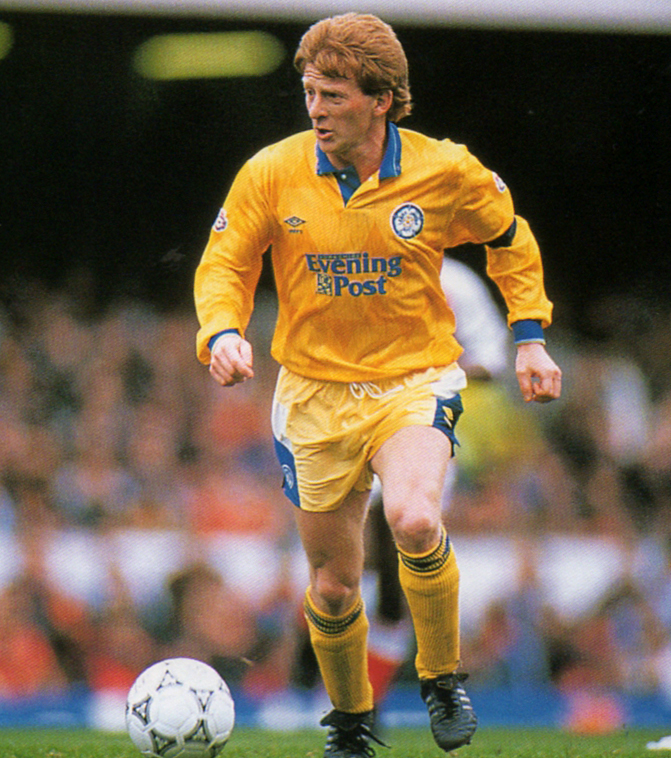Another Leeds United birthday to mark with an appropriate tribute for all the man did for our great club. This time it’s someone who is a contemporary of those 70-somethings who have celebrated recently – the likes of Paul Madeley, Norman Hunter, Paul Reaney and Johnny Giles – but who was never, by his own acknowledgement, anything more than mediocre as a player himself. In the managerial arena though, Howard Wilkinson – 72 years old today – has outstripped virtually all of the Revie greats, winning the last ever Football League Championship, going down in history as the last Englishman to win the league in the 20th Century and masterminding the second incarnation of a winning Leeds team from a starting point remarkably similar to that which Don Revie inherited in the early sixties.
Wilko’s career after his playing days ended was an upward graph of coaching success from humble beginnings, but he went on to have two stints as caretaker-manager of England, as well as spells with Sunderland, Sheffield Wednesday and Notts County. It is for his time at Leeds United, though, that he will be remembered as a football manager who walked into what had become a poisoned chalice of a job, a club with a revolving door on the manager’s office and one which had signally failed to recapture the magic of its one great period at the top of the game. Wilkinson came in with the air of a man who was going to put a stop to all the nonsense and set matters straight. Let the record show that he succeeded, beyond the wildest dreams of any Leeds fan at the time he was appointed.
In TV interviews at that time, he could be seen by the side of chairman Leslie Silver, regarding his coffee cup with little enthusiasm and mildly joking that he hoped we’d be able to afford better crockery when he got us winning. Leeds were treading deep water at the bottom end of the old Second Division, and had been looking more likely to proceed downwards from that point than up; a situation uncannily similar to the one Don Revie found in 1961. Both men would be able to count on the bounteous fruits of a productive academy, though Revie felt able to blood his precocious youths somewhat earlier than Wilko could in his reign. But where Don found his Bobby Collins, so Howard was able to persuade Gordon Strachan to step down a league and be the catalyst for a revival that may not have been as enduring as Revie’s, but was arguably even more meteoric and spectacular.
Wilko joined for the still fairly new 1988-89 season, and spent the rest of that campaign overhauling discipline at the club and bringing about his own type of working environment. The graph spiked upwards from there. In his first full season, with a batch of good, solid recruits added – and after an uncertain start – Leeds went top of the league and hardly faltered until promotion and the Championship were clinched on a sunny day in Bournemouth. A season of high achievement followed as Leeds swiftly found their feet back in the top flight after an eight year absence. United did far more than consolidate, battling away at the top end to finish an eminently respectable fourth, as well as reaching two domestic semi-finals. The following season was the last of the old-style Football League, and Wilko’s Leeds achieved immortality by winning the Title by four clear points to become the Last Champions. Less than four years after joining a club going nowhere but downhill, Howard Wilkinson had restored Leeds United to the very pinnacle of the game. It had taken Don Revie twice as long to win his first League Title.
While all this had been going on, Howard and his staff had been overseeing the development of an Academy setup which would go on to produce many stars towards the end of the century; many players who are still flourishing at the top level had their start in what was rightly famed as a world-class breeding ground for football talent.
One of the main regrets of the Wilkinson era at Leeds is that he did not survive long enough in the job to introduce these home-grown prodigies into the first team himself. But Wilko’s later years at Leeds coincided with boardroom uncertainty and financial mismanagement, both of which had their effect on sales and recruitment policy. So, we lost a Speed here and a Batty there and the likes of Carlton Palmer and Nigel Worthington came in; the club was reduced to offering pre-retirement homes to such as Ian Rush and David O’Leary. O’Leary it was, after a George Graham interregnum, who gained the most from Wilkinson’s enlightened youth development programme. Looking back, it’s clear that things could have worked out differently – quite probably the seeds of our 21st Century disaster were sown in Wilko’s 1996 sacking.
Howard Wilkinson stands alone behind Don Revie as Leeds United’s second-greatest manager, and probably as one of the more wronged men to have lost his job when so much of it had already been done to ensure the club’s own crop of major stars. As before, Leeds lacked the courage and patience to see it through; but these things are always clearer with the benefit of 20:20 hindsight.
Happy Birthday, Sergeant Wilko – you’ll always be remembered fondly at Elland Road, and your place in the history of English football is secure.





















